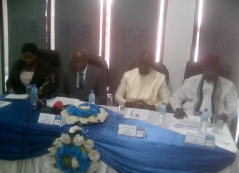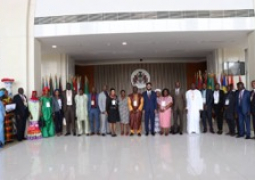
The ceremony was held at their headquarters in Bijilo. The Islamic Microfinance aims to nurture the economic wellbeing of middle- and low-income earners through sustainable, equitable and transparent financial service solutions driven by resourceful personnel using digital means that promote financial inclusion and alleviate social injustice and poverty.
At a recent press briefing, Dr. Saikou Jabbi, deputy governor of the Central Bank of The Gambia (CBG) said Islamic finance, despite its name, is not a religious service restricted to Muslims alone.
He explained that it is a financial service meant to meet the requirements of specific group of investors.
“The Islamic finance is bound by Islamic law and practice of Prophet Muhammed. The principle of Islamic finance is based on the prohibition of interest, gambling, and speculative trade, while it encourages partnership and risk-sharing in contracts between financial institutions and customers,” he said.
Commenting on the importance and uniqueness of Islamic finance, he said many central banks in the sub region saw the need to develop Islamic finance for many reasons including enhancing financial inclusion process to cater for some sizeable unbanked and under banked population into the formal financial sector, and to cheaply mobilise deposits to finance growth and development.
Momodou Joof, managing director of APS told journalists that the traditional model of conventional microfinance have not really dealt with the endemic nature of financial exclusion and purported use of access to microfinance as a means of addressing poverty and social injustice has proven to work effectively so far.
He added that yet, financial inclusion in The Gambia still stands at 20% or thereabouts despite the high number of commercial banks.
“That is why the introduction of APS Islamic Microfinance with fully shariah compliant products and services gives the public an undeniable opportunity to deviate from indulging in interest based finances and risk the wrath our creator.”
With the launch of APS Islamic Microfinance, he said there is no excuse that the country is in short supply of fully shariah compliant financial services.
MD Joof assured that APS is ready and determined to collaborate with likeminded development partners locally and internationally in promoting financial inclusion, poverty alleviation and economic development.
Imam Ousman Jah, chairman of APS Shariah Board, said the financial service would help in reducing poverty in the country, adding that financial service is not only limited to Muslims, but all can utilise it regardless of religion and nationality.
Read Other Articles In National News

Media Advisory President Barrow Fulfils Promise to UTG Students’ Union
Oct 7, 2021, 12:18 PM

YKN gives 300,000 worth of items to Babylon Comprehensive School
Nov 30, 2022, 10:06 AM



